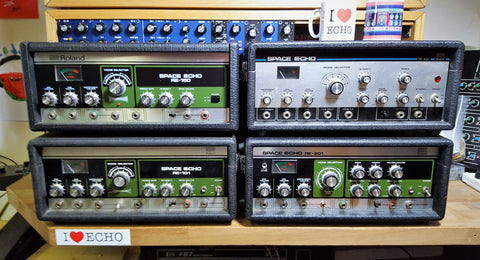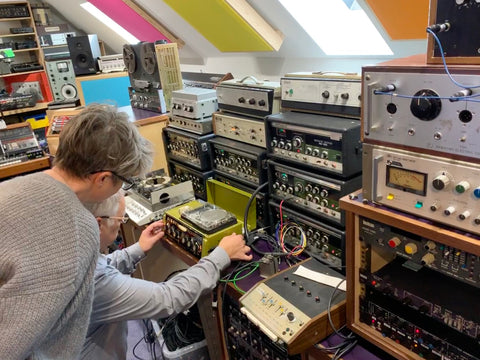Regeneration: Synths Beyond Sustainability by Tony Miln
Oct 24 2018 1 Comment Tags: Synthesizer, tech talk
Regeneration: Synths Beyond Sustainability by Tony Miln
The recent climate change coverage in the media is a wake up call that we ignore at our peril (looking at you, President Trump). I've written about the importance of us educating and training new technicians to ensure the future of the classic instruments and gear that we all use and cherish, but is there also an environmental argument for doing so?
Most modern synths, effects and amps are surely more energy efficient than their predecessors, but what is the cost of continuing to deplete precious resources by churning out an endless stream of ever-cheaper new products? On the surface, it’s great being able to purchase a new hardware synth for less than you’d have paid for a software version ten years ago. However, these cheap electronics are manufactured using SMT (surface mount technology) components which, due to the tiny scale of their circuits, are beyond the capabilities of most repair technicians (if you can find one) once they fail. The economies of keeping costs down often dictates that manufacturer support will evaporate once the warranty expires. If even a minor component fails on a modern synth it can be considered to be beyond economic repair. Can you imagine dropping your vintage Minimoog in the trash because an oscillator stops working? Less of a stretch to picture the same happening with Behringer Model Ds in five, ten or twenty years’ time…

Given the state of our planet, yesterday’s (and sadly also today’s) cheap electronics mantra of ‘replace not repair’ is anachronistic and completely out of step with how we should regard newly-manufactured products. It’s the same across many areas of consumer society: rather than buying one well-made pair of shoes that last, and can be repaired, we are offered a stream of ‘designer’ options that either fall to pieces, or fall out of fashion, only a matter of months later. Certainly a quick look through the corporate websites of a few of the large manufacturers of modern music equipment reveals that terms such as Product Life Cycle, Carbon Footprint and Embodied Carbon are noticeable by their absence. If anyone knows of meaningful policies around these issues among such companies do let us know in the comments below.

Many people understand that we have to move towards more sustainable practices to improve the situation, but slowing climate change may not be enough. There are those who suggest that we need to reverse the process, and talk of us moving towards a more regenerative society: not just carbon-neutral, but carbon negative.
I like to think that our efforts to regenerate old equipment that might otherwise be consigned to the scrapheap is part of this movement towards a sense of responsibility for our resources. Taking something that has already been manufactured and, with care and expertise, bringing it back to useful operation (sometimes improving on the original design) so that it will continue to serve a useful function well into the future, is just one way we can slow the squandering of the earth’s resources. And our techs, who specialise in squirrelling away old parts and seem allergic to ever throwing anything out, are very pleased that their natural hoarding instinct has now been re-branded as "diverting waste from landfill".


Another area we are keen to improve on is offsetting the environmental cost of packing and shipping gear around the planet. We already recycle as much packaging as possible, and are working with B1G1 planting trees in Borneo, as well as supporting clean water initiatives and other causes that make a difference to the environment. We are hoping to add an option at checkout on our new website that will encourage customers to further offset the carbon footprint of their purchases as well as investigating more environmentally-friendly packaging options. Several employees have expressed interest in the Cycle To Work Scheme, which we are instigating (no small commitment in chilly, hilly Derbyshire) and we use energy from renewable sources to power our office, workshops and studio. The new Soundgas Studio Service, which allows customers to access our processing gear remotely, could even reduce the amount of travel required when recording/mixing.

Soundgas is not just about doing the right thing for our customers and employees, it is also a commitment to be a force for good in our community and the wider world, and to effect positive change via our actions. I urge anyone who is not already familiar with the UN Global Goals for sustainable development to check their site here: https://www.globalgoals.org/ and to do whatever you can, no matter how small, to help move the planet towards a better future. And to feel good about yourself for your desire to recycle and regenerate old recording equipment and instruments rather than buying yet another disposable piece of plastic...
1 Comment






How about doing a electronics hobbyist leg up course. I’m sure there are loads of basic kit builders and repairers out there that would benefit from better fault diagnosis skills for through hole and SMD circuit repair. Id be first in line for a top up / refresher day.
Leave a Comment